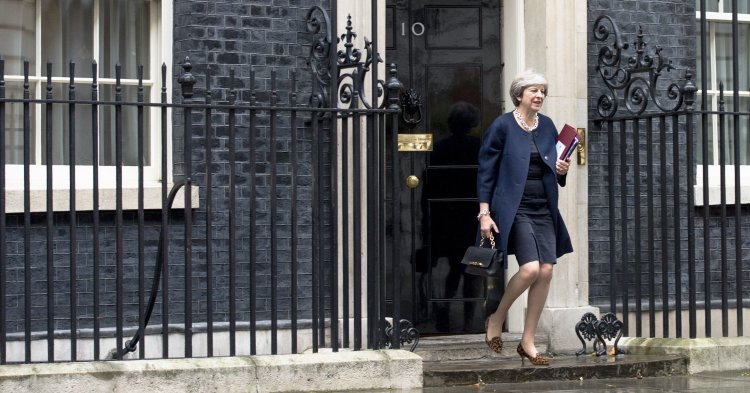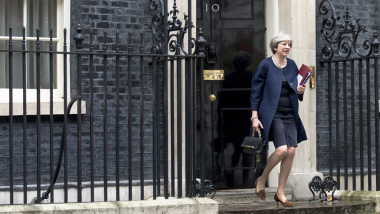#7: Scottish government publishes bill to have a new independence referendum
On Wednesday, the Scottish government published a bill that details the rules of any new independence referendum. Upon publishing the independence referendum bill, Scotland’s First Minister Nicola Sturgeon said that a referendum would be an “opportunity to choose to be an independent European nation - rather than have a Brexit future imposed on us”.
The date of the referendum would need to be decided later but the ambition of the Scottish government, controlled by the Scottish National Party, is to hold a referendum by 2021. The next Scottish Parliament elections are due to take place in May 2021. Thus far, three contenders to be the next UK Prime Minister have already pledged to refuse Scotland permission to hold a new referendum.
#6: House of Commons Speaker John Bercow to stay on
The House of Commons Speaker John Bercow – who has gained international fame for maintaining OOORDEEER in Westminster – has said he will stay in his post, despite earlier promises to quit this summer. The announcement comes following the prolongation of Brexit. In a speech in the United States, Bercow also said that the Parliament must have its say before the UK could leave the EU without a deal. John Bercow’s statements present difficulties for Conservative leadership contenders Boris Johnson and Dominic Raab who have entertained the option of leaving the EU without a deal.
#5: Despite a hammering in European elections, Labour’s Jeremy Corbyn still supports Brexit
In the European elections last Thursday, Labour only placed third, losing to the Liberal Democrats who campaigned on a clear anti-Brexit platform. After the elections, the Labour leader Jeremy Corbyn addressed the party’s ambiguous stance on Brexit. This Wednesday, Corbyn said that Labour would renegotiate the Brexit deal and then put it to the public. However, such a public vote would not repeat the choice between staying or leaving. On Thursday, The Guardian reported that “Corbyn still backs soft Brexit and rejects in-out referendum”.
Despite Jeremy Corbyn’s insistence, the EU has repeatedly said that it won’t renegotiate the Brexit deal. Earlier this week, The Independent reported that the EU has ‘broken up’ the team that was tasked with negotiating the deal with the UK.
#4: Pro-European parties gain 20 new seats in the European Parliament
In the European elections in the UK, the Liberal Democrats, the Greens and Northern Ireland’s Alliance Party gained a total of 20 new seats in the European Parliament: 15, 4 and 1 respectively. Labour and Conservatives lost 10 and 15 seats respectively. Nigel Farage’s current party, “the Brexit Party”, won 29 seats while Nigel Farage’s former party, UKIP, lost 24 – a monumental shift of voters from Nigel Farage to Nigel Farage.
Overall, anti-Brexit parties who got 40.4% of the vote beat the hardline Brexiteer UKIP and Brexit Party, which got 34.9% of the vote combined. The rest of the votes were given to Labour and the Conservatives. The Conservative Party collapsed to the fifth position, the party’s poorest-ever showing in a UK-wide election.
#3: Up to two million EU nationals denied their vote in European elections
As discussed on The New Federalist earlier, the top story from the election day was the turning away of EU nationals from polling stations. The fact that the government had denied the vote would take place until the last moment contributed to failures to process the voter registrations of European nationals who sought to exercise their right to vote in their country of residence. Local councils not sending all the necessary forms to EU nationals was a common issue that led to the failure.
Between one and two million citizens were denied a vote in the elections. The total number of votes cast was just over 17 million. The 3 Million, a group representing the interests of EU nationals living in the UK, is planning legal action against the UK government for the misconduct of the elections.
#2: Theresa May resigns as Prime Minister
The pressure for Theresa May to resign as Prime Minister finally became unbearable last Friday. Theresa May had dodged the bullet on a number of occasions earlier, but her leadership no longer survived, as she had earlier promised MPs a vote on whether to have a new EU referendum, on condition that they support her Brexit deal.
Though Conservative MPs had tried and failed to oust the Prime Minister towards the end of last year, and she enjoyed immunity until December 2019, anti-EU Conservatives were planning to change the party’s rules so that the Prime Minister could be pushed off earlier. The Prime Minister decided to jump before being pushed, and announced that she will resign on 7 June. Before that, she will still host a visit to the UK to be made by Donald Trump.
#1: Accused of lying to the public, Boris Johnson to appear in court
After Theresa May’s resignation, the Conservatives will choose their new leader, who is then expected to become Prime Minister without a general election – in what is undoubtedly an expression of the sacred “will of the people”. The frontrunner in the race is Boris Johnson whose campaign, however, has been overshadowed by a court case in which he is accused of misconduct in public office.
The court case was launched after Boris Johnson famously led the pro-Brexit campaign in the 2016 EU referendum, claiming that the UK is ‘sending the EU £350 million a week’. Already in 2017, the head of the UK Statistics Authority said that the claim was “a clear misuse of official statistics”, Al-Jazeera reports. Boris Johnson’s lawyers said the crowdfunded court case is a “stunt”, but the District Judge who considers the case said that it is appropriate to proceed with a trial.




Follow the comments: |
|
